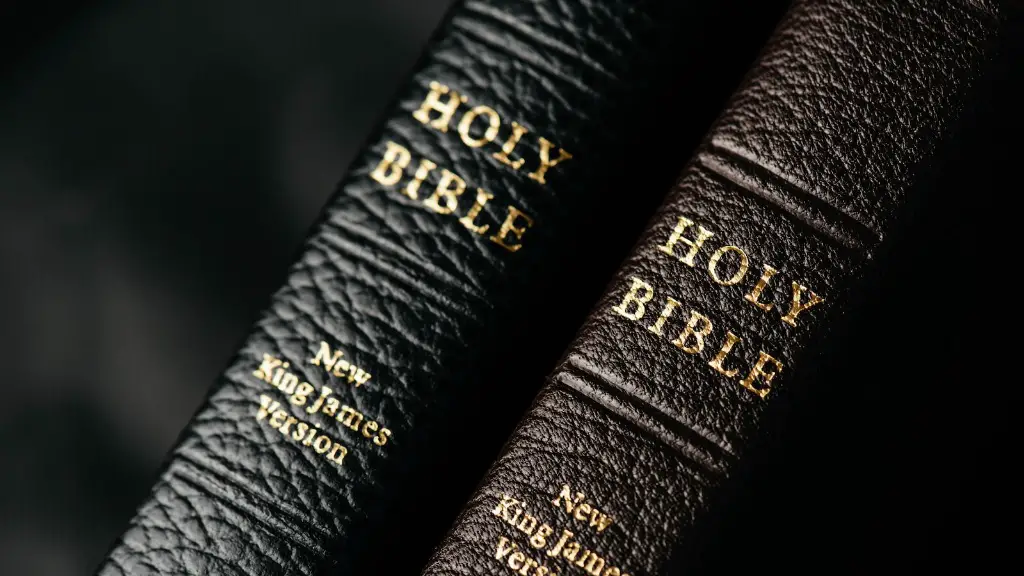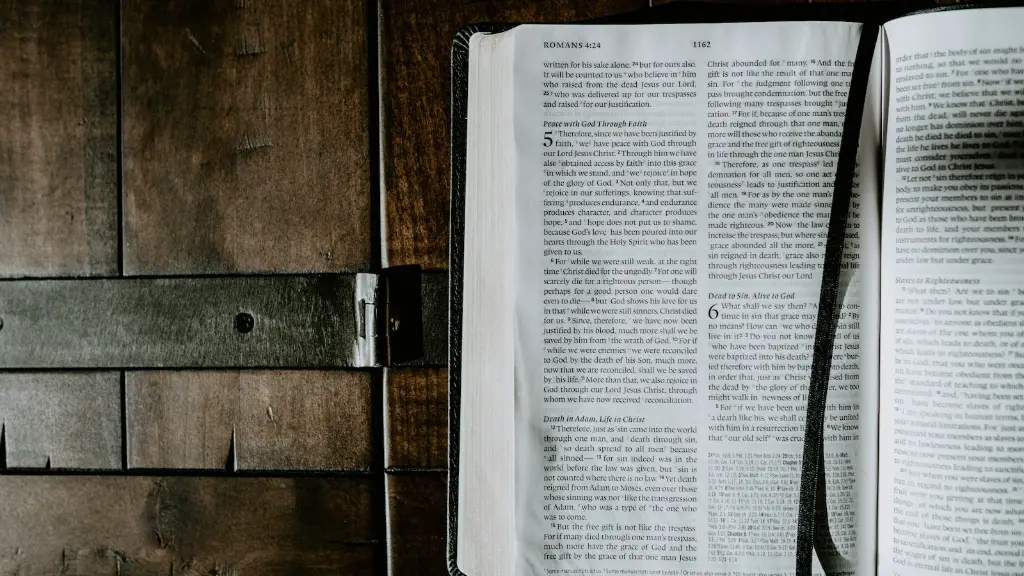Since the beginning of recorded history, humans have been debating the use of the death penalty as a viable form of punishment for certain crimes. In modern times, this debate is clouded by the question of if the death penalty is supported by the Bible. While the Bible never explicitly states if it supports or rejects the death penalty, there are several passages that give us a better understanding of its stance on this divisive issue.
The most direct reference to the death penalty can be found in the book of Genesis. When discussing the code of behavior which God wishes to be followed, it states “whoever sheds a human life, by a human being shall that life be also be shed.” This has caused many to interpret this passage as advocating for capital punishment as a form of restitution.
In the Hebrew Bible, the concept of justice is closely connected to the idea of “an eye for an eye”. This is to be taken literally, as it states “whoso sheds man’s blood, by man should his blood be shed”. This is an example of lex talionis, or “law of retaliation”. This is essentially revenge for a crime, and can be seen in other punishments such as revenge killings and vendettas.
The New Testament can also be used to support the death penalty. Jesus himself speaks on the matter in the Gospel of Matthew when he states “Whoever Take the sword will die by the sword”. The passage speaks to the legitimacy of meting out justice, if only in self-defense. Additionally, Paul of the New Testament speaks on the issue of punishing criminals, stating that the government is “the servant of God, an avenger who carries out God’s wrath on the wrongdoer”.
Though it is not directly addressed, the Bible could be seen as some forms of capital punishment. This could include executions, as well as life imprisonment. An example of this would be the story of Sodom and Gomorrah and the punishment that was handed down. This can be seen as a form of capital punishment, as the cities were destroyed and their citizens were killed.
The Bible does not outright support the death penalty, but there are several passages that have been interpreted as allowing for capital punishment. While it can be argued that the Bible is not clear in its stance on the issue, one could argue that it does sit in line with the idea of “an eye for an eye” when it comes to punishing criminals.
The Cost of the Death Penalty
The death penalty is extremely expensive for governments to administer. According to the Death Penalty Information Center, death penalty trials cost significantly more money than trials where life in prison is the maximum sentence possible. This is due to the lengthy appeals process involved in a death penalty trial, as well as the additional costs associated with providing the proper level of legal representation. This cost, in combination with the fact that there is no evidence to suggest the death penalty deters crime, has led many states to repeal their death penalty laws.
In addition to the financial cost of the death penalty, there is also a moral cost. This moral cost can be seen in the fact that execution is the ultimate violation of human rights. It also sends a message that murder is a justified punishment, which goes against many modern moral beliefs. Additionally, there is always the risk that an innocent person may be punished, which would be an unacceptable consequence.
The cost of the death penalty is not just financial, but also moral. This cost is too great to overlook, and must be taken into account when considering whether or not the death penalty should be supported.
The Alternatives to the Death Penalty
The death penalty is not the only means of punishing criminals. There are several other options available, such as life in prison without parole or a term of years in prison. These alternatives offer a sense of closure for victims and their families, but also respect the rights of the defendant. Additionally, these alternatives allow for the possibility of rehabilitation and redemption for the offender.
Life in prison without parole is one of the most effective alternatives to the death penalty. This alternative removes the possibility of the offender being released from prison and committing additional crimes. In addition, life in prison without parole allows states to save money, as these sentences tend to be significantly less expensive than the death penalty. This alternative also provides victims and their families with closure, but also respects the rights of the defendant.
Alternatives to the death penalty are available, and in some cases can be more effective than capital punishment. These alternatives offer victims and their families a sense of closure, but also respect the rights of the defendant. In addition, these alternatives tend to be less expensive than the death penalty and offer the possibility of rehabilitation and redemption for the offender.
The Impact of Race on The Death Penalty
Race is an important factor when discussing the death penalty. African Americans and other racial minorities are disproportionately incarcerated and sentenced to death. This can be seen in the fact that African Americans make up 13% of the population in the United States, yet they account for 40% of individuals currently on death row.
The discrepancy in the number of African Americans sentenced to death has been attributed to a number of factors, such as implicit racial bias, economic disparity, and unequal access to legal representation. The problem of racial bias in the criminal justice system is further compounded by the fact that the death penalty can be arbitrarily applied, as the decision to seek a death sentence rests solely with the prosecutor.
The disproportionate number of African Americans and other racial minorities on death row has led to the conclusion that the death penalty is being applied on the basis of race rather than on the severity of the crime. This conclusion is supported by the fact that individuals who commit similar crimes are given vastly different sentences, depending on their racial background.
It is clear that race plays a significant role in the administration of the death penalty, and that this issue needs to be addressed. Without a thorough examination of the issue and a concerted effort to eliminate racial bias in the criminal justice system, the death penalty cannot be seen as a legitimate form of justice.
Religion and the Death Penalty
Religion plays an important role in the debate over the death penalty. Several religions have taken a stance on the issue, either supporting or rejecting capital punishment. For example, the Catholic Church is strongly opposed to the death penalty, as it believes that it is incompatible with respect for the human person. Other religious organizations, such as the Church of Jesus Christ of Latter-day Saints, support the death penalty as a way to protect innocent life.
The Bible is an important resource in this debate, as it provides insight into the views of ancient cultures and gives context to the modern discussion. While it does not explicitly support or reject the death penalty, passages from both the Old and New Testaments can be interpreted in a number of ways. Ultimately, it is up to each individual to determine for themselves whether or not the Bible supports the death penalty.
Religion plays an important role in the discussion of the death penalty. While each individual is responsible for forming their own opinion on the issue, it is important to take into account the views of the various religious organizations and interpretations of the Bible.
Conclusion
The death penalty is a complex and divisive issue. While the Bible does not explicitly state if it supports or rejects capital punishment, there are passages which have been interpreted in both ways. Additionally, there are other factors to consider when discussing the death penalty, such as the cost, the impact of race, and the religious opinions of various organizations. Ultimately, it is up to each individual to determine for themselves whether or not the Bible supports the death penalty and to decide what stance they wish to take on this important issue.





